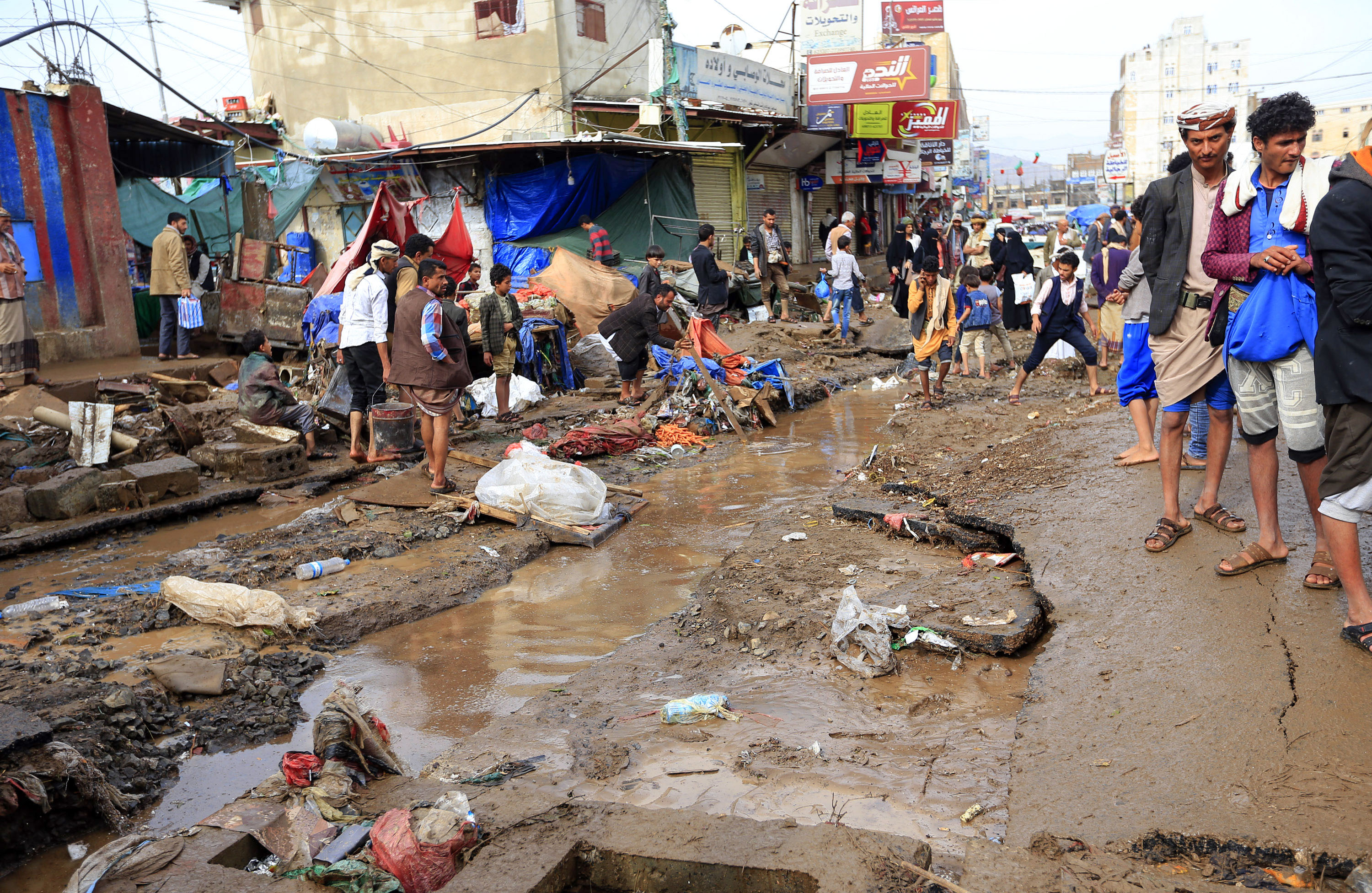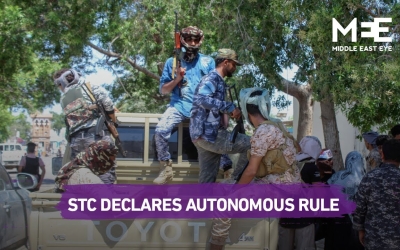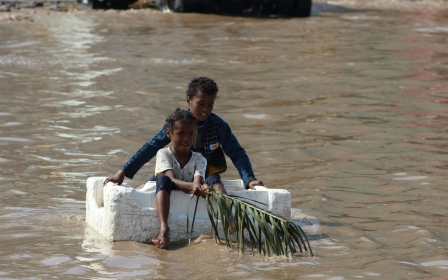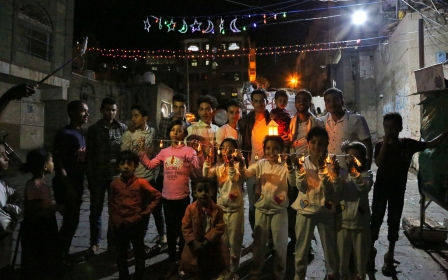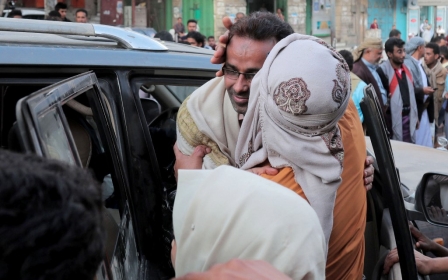Yemen's Aden sick of power games as southern separatists declare self-rule
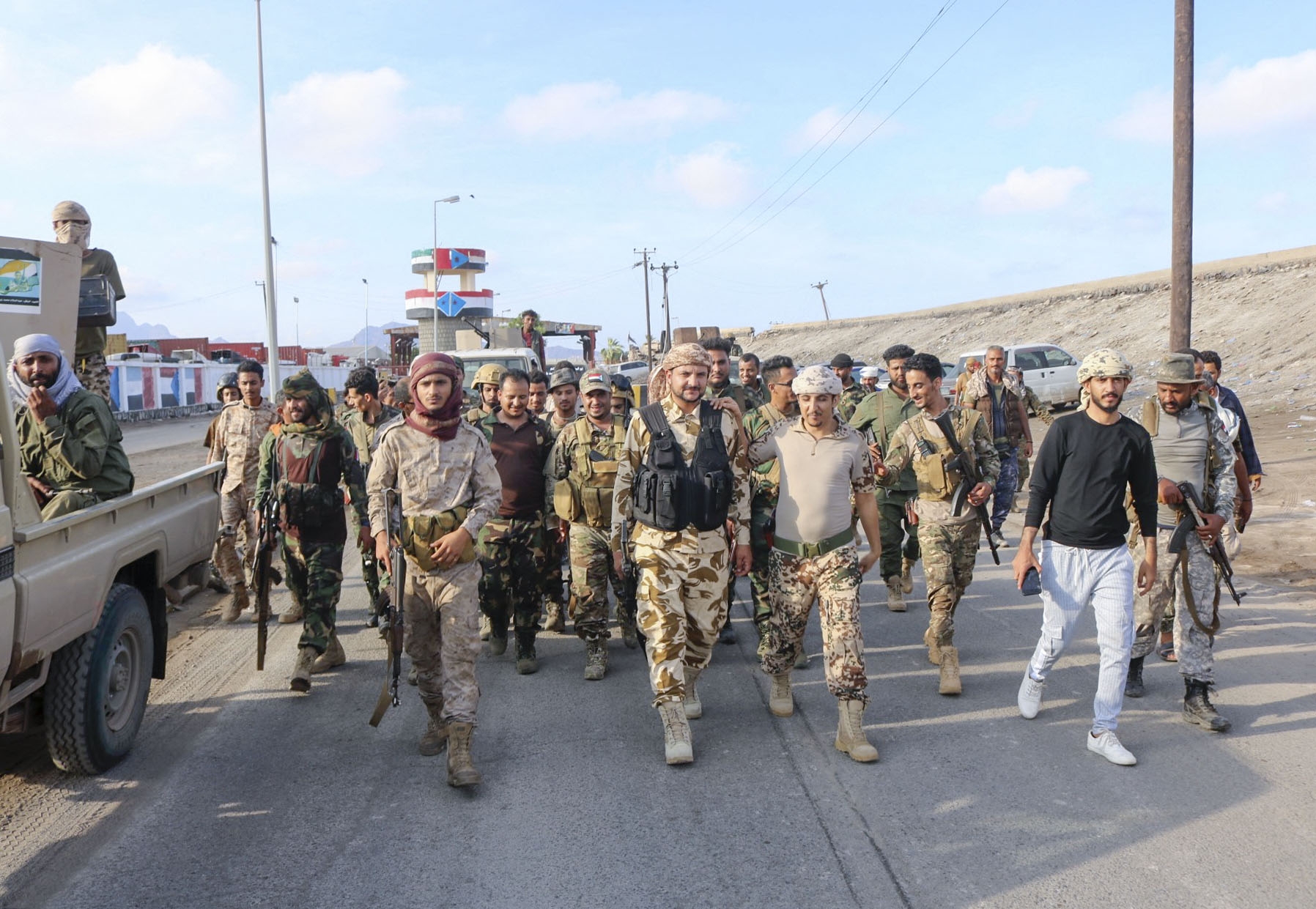
Yemenis have expressed weariness with the latest declaration of self-rule from the southern secessionist movement that controls Yemen's port of Aden.
The Southern Transitional Council (STC) also declared a state of emergency in southern Yemen in the wake of devastating floods, but residents of Aden say they have had enough of the power struggle that has marred the south for years.
The secessionist movement's decision comes six months after it reached a Saudi-backed power-sharing agreement with the internationally recognised government to end infighting that risked opening a new front in Yemen’s war.
Who is Yemen's Southern Transitional Council?
+ Show - HideFormation
Formed in 2017, the Southern Transitional Council is a secessionist movement focused on gaining independence for South Yemen. Comprising of 26 members, the STC includes five governors from Southern Yemen and two former government ministers.
The STC emerged after Hadi fired Aden governor Aidarus al-Zoubaidi for alleged disloyalty in April 2017.
Hadi accused Zoubaidi of prioritising the Southern Yemen independence movement over a united Yemen. Following Zoubaidi's sacking, mass rallies were held in Aden to protest Hadi's move.
The STC was subsequently created a month later, with Hadi describing the council as illegitimate.
Historical background
The call for independence has been a source of contention for over a century. South Yemen's origins can be traced back to 1874 when the British Empire created the Aden colony and Aden protectorate.
Following its independence from Britain, South Yemen was formed in 1967 and later became the People's Democratic Republic of Yemen in 1970, a Soviet Union-backed Marxist-Leninist state, the only one of its kind in the Middle East during the Cold War.
The Soviet Union's collapse led South Yemen to merge with the North to form a unified Yemen. That union, however, lasted only four years and led to the 1994 civil war, when South Yemen army units accused northern president Ali Abdullah Saleh's forces of corruption.
In 2007, the Southern Movement, also known as the al-Hirak al-Janoubi, was formed. Its stated aims were to demand equality under the law and a change in relations between north and south in the context of a united Yemen.
The Hirak was met with repression by Saleh's government. This set the foreground for the Southern independence movement to flourish during the Arab Spring after the Hirak began to champion Southern independence in 2009.
Backers
In 2016, the UAE helped create the SBF in southern Yemen. The SBF included many militants who supported a secessionist movement in Southern Yemen.
Forces within the SBF supported the STC, with the aim of establishing an independent South Yemen state. Since its formation, the SBF has played a crucial role in the Saudi-led coalition before the recent escalation.
Its successes came in part due to being militarily backed by the UAE. The backing included training of SBF fighters in Abu Dhabi and the supply of military equipment.
After receiving training, the SBF was dispatched to fight Houthi forces operating inside southern Yemen.
Emirati backing was crucial in helping the STC gain Aden, which has been under its control since 2018.
The Riyadh agreement has yet to be implemented and has so far failed in bringing about change for the residents of the south. Now, the STC's declaration further complicates a war that has so far killed more than 100,000 people.
Residents in the port city of Aden say the declarations and statements from either the STC and its UAE-based leadership, or the government, will not improve conditions for ordinary people.
New MEE newsletter: Jerusalem Dispatch
Sign up to get the latest insights and analysis on Israel-Palestine, alongside Turkey Unpacked and other MEE newsletters
What they want, they say, is to see them improve the city and help to reduce people’s suffering.
“While the floods are destroying our houses and militias spread out everywhere, the STC is announcing a state of emergency and some other decisions,” Ahmed Alwan, an Aden resident in his 50s, told Middle East Eye.
Severe flooding in Yemen in recent weeks has impacted around 100,000 people, according to the United Nations, with Aden especially affected. It has contaminated water, damaged roads and disrupted access to basic services.
“We are no longer happy to hear the mercenaries either in Saudi Arabia [the government] or in the UAE [STC] declaring new steps, we need them to work and improve the services instead of taking decisions.”
Yemen is also facing the threat of the coronavirus pandemic and its inability to detect and deal with a widespread outbreak.
Originally from Aden, Alwan added that he doesn’t believe in any statement unless there are changes on the ground, adding that anyone taking decisions from outside Yemen is a “traitor”.
“I’m asking the traitors who are fighting over the south, why do you not work from Aden? Why are you based in Saudi Arabia and the Emirates?” he said.
“They know very well that Aden is not safe, and it is not a good city to live in, so they want to sell it to invaders and spend their lives abroad.”
Revolution without the revolution
Alwan said his anger is directed toward both political sides controlling the south, after believing in their promises. Now, he says, he doesn’t believe the leaders are working toward alleviating the suffering of the people.
“The STC had previously announced the independence of the south under other names, like revolution and liberation, but they did not do anything on the ground,” Alwan added.
“If the STC was able to do anything on the ground it would have done so already, but the fact is it isn’t and it only waits for the Emiratis to guide them.”
People like Alwan say they want nothing more than peace and development, so some now hope that the UN will intervene and push both the government and the STC out of the port city.
“Personally, I do not trust Saudi Arabia or the UAE as both are involved in Yemen’s war and I’m only calling the UN to intervene and liberate us from them all.”
The STC launched battles against the Yemeni government in August and its forces took over Aden, and most of Lahj and Al-Dhale provinces. The rest of the southern provinces remained under the control of the Yemeni government.
In November, the government and the STC signed a Saudi-brokered agreement to end their power struggle in the southern region and unify ranks against the Iran-backed Houthi rebels in the north.
"This agreement will open a new period of stability in Yemen. The kingdom of Saudi Arabia stands with you," Saudi Crown Prince Mohammed bin Salman said at the signing ceremony in Riyadh.
A Gulf decision
On Saturday night, the STC declared a state of emergency and autonomous rule across all southern provinces starting from Sunday.
The statement it released said the measures being brought in are meant to save the people of the south and preserve the achievements and victories of its resistance, especially after five years of war, in which the government has not fulfilled its obligations.
Since August 2019, all public institutions in Aden have been controlled by the STC.
The statement, which was released from the UAE, called on the south to stand with and support their political leadership, to help implement self-rule measures for the region.
The separatist group called on the Saudi-led coalition, which intervened in Yemen’s war in 2015, and the international community, to support its autonomous rule to achieve security and stability of the people.
“We supported our leadership from the start, and we should keep supporting them until the end as they know how to work until they achieve independence of the south”, an STC member in Aden told MEE on condition of anonymity for security concerns.
He confirmed that Aden is under STC control and that they will push ahead with independence once the council’s leadership and the relevant Gulf countries have made that decision.
“The Saudi-led coalition intervened to help Yemen and we [STC] are part of this coalition so we cannot work alone, but in coordination with the coalition,” he said.
“The new step by the leadership is great and it sends a clear message to the government not to return to Aden until they reach an agreement with the countries of the coalition.”
The STC member said the Saudi-led coalition supports their aspirations to achieve a separatist state, noting the welcome given to the council’s leadership in the UAE as evidence.
“If the coalition was against our goals, the UAE would not have allowed our leadership in Abu Dhabi to go for this self-rule step,” he said.
On Monday, the coalition urged the STC to honour the terms of the Riyadh agreement and share control of Aden with the government.
“The Coalition urges for an immediate end to any steps contrary to the Riyadh Agreement, and work rapidly toward its implementation,” the statement said.
On Sunday, Adel al-Jubeir, the Saudi minister of state for foreign affairs, tweeted: “We in KSA and the UAE strongly believe that the internationally backed Riyadh Agreement has guaranteed an opportunity for the brotherly Yemeni people to live in peace.
"We reject any hostilities that will jeopardize the safety and stability of Yemen.”
Soft statement
The Yemeni government, meanwhile, called on the UN, the Arab League, the Organization of the Islamic Conference and the Gulf Cooperation Council to condemn the move and enforce the UN Security Council's resolution that supports the unity and territorial integrity of the Republic of Yemen.
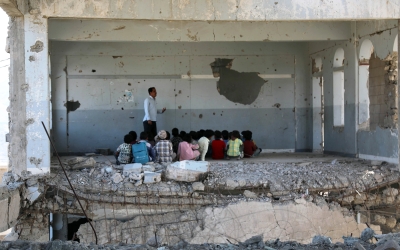
The government also urged the coalition to uphold its “historical responsibility toward the territorial integrity of Yemen.”
The statement insisted that the Yemeni government had met all its obligations under the Riyadh Agreement, whereas the STC had continuously sidestepped it, before declaring self-rule.
Omar Al-Hammadie, 37, used to live in Aden but in 2019 he decided to return to his hometown in Taiz province as he faced harassment from southern forces in the port city.
“The STC is not strong but it draws strength from the UAE,” Hammadie told MEE.
“The coalition’s statement did not condemn the move by the STC, but instead it was a soft statement to send a message to the world that the coalition supports peace.”
Hammadie said that only Aden’s residents know the reality of the STC, and most southerners do not support the council, which only controls Aden city and some areas in Lahj and Al-Dhale.
'There are disputes among the southerners themselves, and the STC can’t take any further steps on the ground because they will face resistance from people in the south'
- Omar Al-Hammadie, Taiz
“There are disputes among the southerners themselves, and the STC can’t take any further steps on the ground because they will face resistance from people in the south and not from the government,” he added.
“I know the STC depends on the UAE, but I can confirm that most of the southerners have started learning the reality of the UAE, as it only wants to take our wealth and that is not acceptable.”
However, on Tuesday Emirati Foreign Minister Anwar Gargash said the UAE is against the STC's unilateral move, adding that "frustration" with the Riyadh agreement's delay was no justification.
The UAE has confidence in Saudi Arabia's commitment to implement the agreement, Gargash said in a tweet.
Middle East Eye delivers independent and unrivalled coverage and analysis of the Middle East, North Africa and beyond. To learn more about republishing this content and the associated fees, please fill out this form. More about MEE can be found here.


